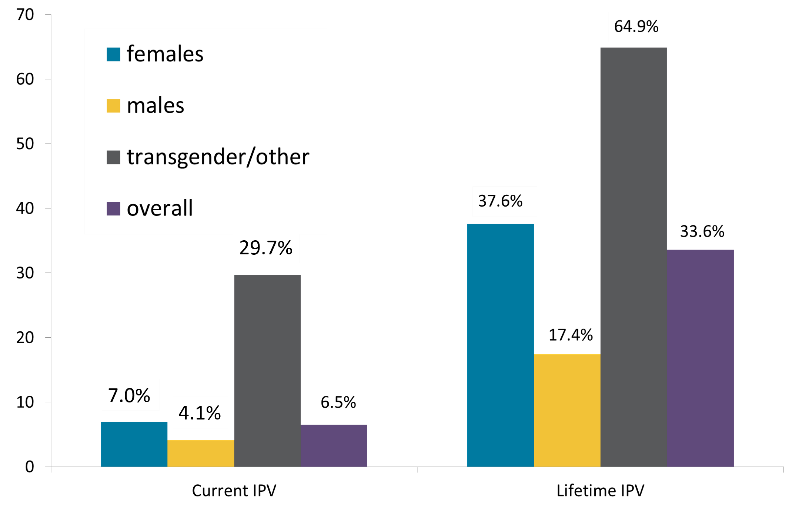Supporting Gender and Sexual Minorities
Domestic violence (DV) has significant impacts on workers and workplaces. In a recent pan-Canadian survey, we documented, for the first time, rates and impacts of DV on victims and their co-workers, including how health and life quality are affected, and supports offered by the workplace (see Further Readings). We were very grateful to have 37 people identifying as a gender minority (GM) respond to the survey – a small group compared to the overall sample of about 8500 people, but a large group when we consider how little we know about the experiences of gender minorities in this context.
We’ve known that gender and sexual minorities tend to experience higher rates of domestic violence, but I think we were even surprised when a staggering 65% of our GM respondents indicated they had experienced DV in their lifetime – this was 2-4 times higher than for men or even women (see Figure). In terms of impacts of DV at work, of GM people with lifetime DV experience:
- 62.5% reported that the DV had affected their ability to get to work, compared to 40.3% for non-trans women and 32.4% for non-trans men.
- 12.5% had lost a job due to DV, compared to 9.2% for non-trans women, 4.7% for non-trans men.
- 71% reported that DV had continued at their workplace (e.g., abusive calls, abuser came to workplace, etc.), compared to 54.1% for non-trans women, 48.3% for non-trans men.
- 37.5% had taken time off due to DV (42.8% for non-trans women and 27.6% for non-trans men).
- All but one (95.8%) reported that their work performance was impacted by the DV (e.g., due to being distracted or feeling tired and/or unwell).
Also, 54% reported that their co-workers were affected by the DV in at least one way (e.g., they were stressed or concerned about the situation), and 29% had discussed the DV with somebody at work (most often a co-worker).
In terms of health, our GM respondents overall (with or without DV experiences) had significantly poorer general health, mental health and well-being compared to those identifying as non-trans men and women. The DV did not seem to impact health, though at this point the sub-groups are quite small, making it difficult to evaluate these numbers.
Our research showed what many have likely intuited – IPV is a widespread and impactful problem that affects many people, and especially those who identify as gender minorities. However, despite the additional burden of stigma associated with both GM status and DV victimization, many people are willing to disclose abuse at work, and seek support. The workplace is well-situated – for its own benefit, and those of its workers – to design strategies to safely respond to and support people of all genders and sexual orientations who experience DV and its impacts. As one of our respondents noted: “[It is] important to remember that this is not a gender issue - both men and women, gay or straight can be victims of domestic violence, or abusers themselves.”

Nadine Wathen (centre) receiving the Research Poster award at the Nursing Network for Violence Against Women International’s conference in Melbourne, Australia in October 2016 for a poster called: Health and Other Impacts of Domestic Violence in the Workplace: The Experiences of Trans* People.
For further reading (see also DV at Work Net (Temporarily down as of Feb 25, 2025)) :
Wathen, C.N., MacGregor, J. C. D., Tanaka, M., MacQuarrie, B. J. The impact of intimate partner violence on the health and work of gender and sexual minorities in Canada. International Journal of Public Health (forthcoming)
*Saxton, M. D., Olszowy, L., MacGregor, J. C. D., MacQuarrie, B. J., & Wathen, C.N. (2018) Domestic violence victims’ experiences with police and the justice system in Canada. Journal of Interpersonal Violence. First Published February 14, 2018 https://doi.org/10.1177/0886260518758330
MacGregor, J. C. D., Wathen, C. N., & MacQuarrie, B. J. (2017). Resources for domestic violence in the Canadian workplace: Results of a pan-Canadian survey. Journal of Workplace Behavioral Health. 32(3), 190-205. http://www.tandfonline.com/doi/full/10.1080/15555240.2017.1349612
MacGregor, J. C. D., Wathen, C. N., Olszowy, L., Saxton, M., MacQuarrie, B.J. (2016). Gender differences in workplace disclosure and supports for domestic violence: Results of a pan-Canadian survey. Violence and Victims. 31(6), 1135-1154. DOI: 10.1891/0886-6708.VV-D-15-00078
Wathen C. N., MacGregor, J.C.D., MacQuarrie, B.J. (2016). The relationship between intimate partner violence, work, and health. Journal of Interpersonal Violence, 1-16. online January 19, 2016. DOI: 10.1177/0886260515624236
MacGregor, J. C. D., Wathen, C. N., & MacQuarrie, B. J. (2016). Domestic violence in the Canadian workplace: Are co-workers aware? Safety and Health at Work, 7(3), 244-50. Open access: http://www.e-shaw.net/article/S2093-7911(16)00004-4/pdf
Wathen C. N., MacGregor, J.C.D., MacQuarrie, B.J. (2015). The impact of domestic violence in the workplace: results from a pan-Canadian survey. Journal of Occupational and Environmental Medicine, 57(7): e65-71. DOI: 10.1097/JOM.0000000000000499.






